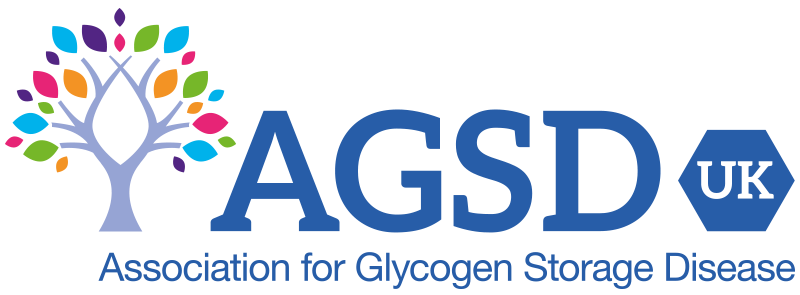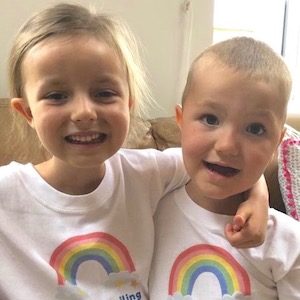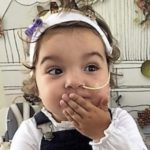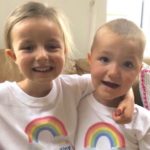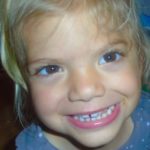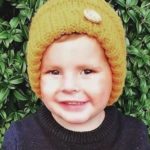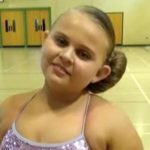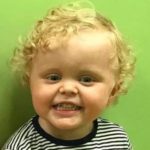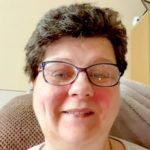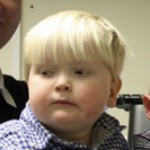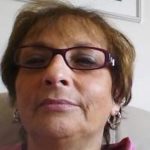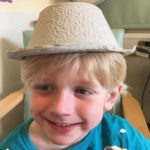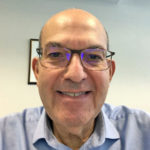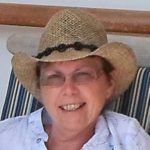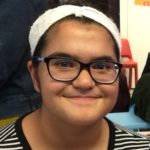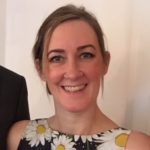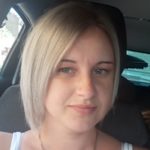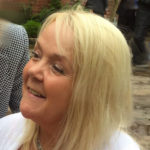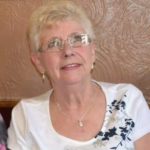Jessie Leggett writes about her two children, Esme and Dexter, who both have a type of GSD4.
Esme’s condition was a mystery
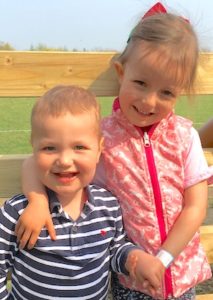
Dexter’s diagnosis led to Esme’s.
Dexter is 3 and Esme is 5 years old. Esme was born floppy, she did not crawl early on, she had poor muscle tone and we knew something was not right. She could not hold her head up and did not walk until she was three and a half. She was tested for a number of conditions in those first years, including cerebral palsy, but it remained a mystery.
When Dexter was born, he was also floppy and needed respiratory support for his small lungs. They were both diagnosed with arthrogryposis (joint contractures) at birth. Dexter became very poorly aged about 2 months and was rushed in to hospital and ventilated. Then we saw a genetic specialist who wanted to test him for GSD4, he was diagnosed in November 2016 aged 3 months. They had Esme’s blood stored and so tested her too.
Finally we had a “label”
Finding out the “label” or name of the condition was reassuring, but also devastating when we learned that there was not much that could be done to treat them. The doctors were surprised with the diagnosis, taking into account the children’s issues, they were getting stronger each day (and they continue to do so).
Our genetic specialist, Dr Joan Patterson at Addenbrooke’s Hospital in Cambridge, made a referral to the Evelina Hospital in London and we saw Dr Rishi Vara in one of their outreach clinics at Addenbrooke’s. We have been to many hospitals including Great Ormond Street, where Esme was due to have heart surgery but it healed in the time we waited and the operation was no longer needed. All their care is now at Addenbrooke’s.
Both children have mutations on the GBE1 gene for GSD4. I have not requested more detail about the specific mutations and sub-type. I just want to focus on the children and what they are doing, how their symptoms are managed. We live in the here and now.
Improving as they grow up
When Dexter was little he had 24 hour CPAP and had an NG tube, so it was very noticeable to everyone that he had high needs. Now they are older, and more independent with their mobility, they do not have breathing support during the day, Dexter just has night-time CPAP. He also had a gastrostomy tube for overnight feeds but he does not need this any more. Both have the arthrogryposis, hyper mobility and hypotonia (low muscle tone). Their condition is not visible and they live happy lives.
Very confident with medical staff
We have managed to make hospital visits part of the norm, so much so that Esme was used as a resource at the Ipswich hospital for teaching junior doctors about hypotonia. Dexter has to have sleep studies in hospital and I cannot stay with him because there is no place for parents to sleep by the bed, so I have to leave him and I stay in nearby Acorn House. When he awakes during the night and the nurses provide support, he is so good and confident, they have never needed to call for me.
Take every day as it comes
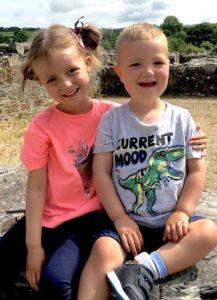
Happy and confident children.
We have never had genetic counselling. Almost three years on, I am slowing starting to process what has happened and it helps that they are both progressing and doing well. As I have come to terms with everything I find that I can speak about them more. I say to other parents, take every day as it comes and trust in the experts that are out there. I am a trained nurse and even with that experience, I find a lot of the terminology complex and the condition difficult to understand.
Two happy, confident children
I have two very happy children, Esme is confident and sassy, Dexter leaves a trail of destruction wherever he goes! He loves craft and dinosaurs and making as much mess as possible. Esme has a Shetland pony called Nut-nut, she rides well and does competitions. This has helped with her core strength. She does not let anything stop her. Our whole family has the same attitude.
